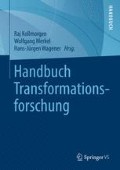Zusammenfassung
Im Gefolge der jüngst ausgerufenen „historischen Wende in den Demokratisierungsstudien“ (Cappocia/Ziblatt 2010) sowie der neuen Popularität des Konzepts der Pfadabhängigkeit in der Variante des Historischen Institutionalismus hat die Transformationsforschung die Erbschaften (legacies) vorangegangener Regime als einen wichtigen Faktor in der Analyse von Prozessen der Demokratisierung und der Konsolidierung junger Demokratien wiederentdeckt. Das Konzept hat insbesondere in der auf Osteuropa bezogenen Literatur großen Anklang gefunden (La Porte/Lussier 2011).
Access this chapter
Tax calculation will be finalised at checkout
Purchases are for personal use only
Preview
Unable to display preview. Download preview PDF.
Literatur
Capoccia, Giovanni;Ziblatt, Daniel (2010): The Historical Turn in Democratization Studies: A New Research Agenda for Europe and Beyond. Comparative Political Studies 43(8/9): 931-968.
Cesarini, Paola, und Hite, Katherine (2004): Introducing the Concept of Authoritarian Legacies . In Hite, Katherine, und Cesarini, Paola (Hrsg.): Authoritarian Legacies and Democracy in Latin America and Southern Europe. Notre Dame, IN: University of Notre Dame Press, S. 1–25.
Collier, Ruth Berins, und Collier, David (1991): Shaping the Political Arena. Critical Junctures, the Labor Movement and Regime Dynamics in Latin America. Princeton, NJ: Princeton University Press.
Croissant, Aurel (2003): Staat, Staatlichkeit und demokratische Transformation in Ostasien. In Bendel, Petra; Croissant, Aurel und Rüb, Friedbert W.(Hrsg.): Demokratie und Staatlichkeit. Systemwechsel zwischen Staatsreform und Staatskollaps. Opladen: Westdeutscher Verlag, S. 203–222.
Croissant, Aurel;Kuehn, David;Chambers, Paul W. und Lorenz (2013): Democratization and Civilian Control in Asia. London: Palgrave Macmillan.
Elster, Jon;Offe, Claus und Preuss, Ulrich K. (1998): Institutional design in post-communist societies: rebuilding the ship at sea. Cambridge: Cambridge University Press.
Hite, Katharian, und Morlino, Leonardo (2004): Problematizing the links between authoritarian legacies and „good“ democracy. In Hite, Katharina, und Cesarini, Paola (Hrsg.): Authoritarian Legacies and Democracy in Latin America and Southern Europe. Notre Dame, IN: University of Notre Dame Press, S. 25–84.
Holtmann, Everhard (2009): Signaturen des Übergangs. Aus Politik und Zeitgeschichte 28: 3–9.
Howard, Marc Morjé (2003): The Weakness of Civil Society in Post-Communist Europe. Cambridge: Cambridge University Press.
Kitschelt, Herbert;Mansfeldova, Zdenka;Markowski, Radosław;und Toka, Gabór (1999): Post-Communist Party Systems: Competition, Representation, and Inter-Party Cooperation. Cambridge: Cambridge University Press.
Kreuzer, Marcus (2009): How Party Systems Form: Path Dependency and the Institutionalization of the Post-War German Party System. British Journal of Political Science 39(4): 669-697.
La Porte, Jody und Lussier, Danielle N. (2011): What is the Leninist Legacy? Assessing Twenty Years of Scholarship. Slavic Review 70(3): 637-654.
Merkel, Wolfgang (2007): Gegen alle Theorie? Die Konsolidierung der Demokratie in Ostmitteleuropa. Politisches Vierteljahresschrift (PVS) 48(3): 413-433.
Morlino, Leonardo (2010): Authoritarian Legacies, Politics of the Past and the Quality of Democracy in Southern Europe: Open Conclusions. South European Society and Politics 15(3): 507-529.
Pridham, Geoffrey (2000): Confining conditions and breaking with the past: historical legacies and political learning in transitions to democracy. Democratization 7(2): 36-64.
Wittenberg, Jason (2012): What is a Historical Legacy? Paper presented at the 19th International Council of Europeanists, Boston, MA, March 22-24, 2012.
Author information
Authors and Affiliations
Corresponding author
Editor information
Editors and Affiliations
Rights and permissions
Copyright information
© 2015 Springer Fachmedien Wiesbaden
About this chapter
Cite this chapter
Croissant, A. (2015). Erbschaften der Vergangenheit. In: Kollmorgen, R., Merkel, W., Wagener, HJ. (eds) Handbuch Transformationsforschung. Springer VS, Wiesbaden. https://doi.org/10.1007/978-3-658-05348-2_40
Download citation
DOI: https://doi.org/10.1007/978-3-658-05348-2_40
Published:
Publisher Name: Springer VS, Wiesbaden
Print ISBN: 978-3-658-05347-5
Online ISBN: 978-3-658-05348-2
eBook Packages: Humanities, Social Science (German Language)

